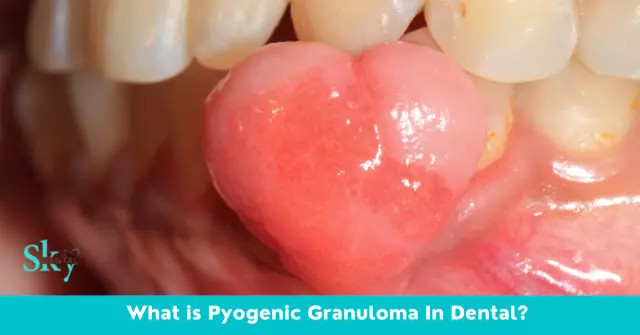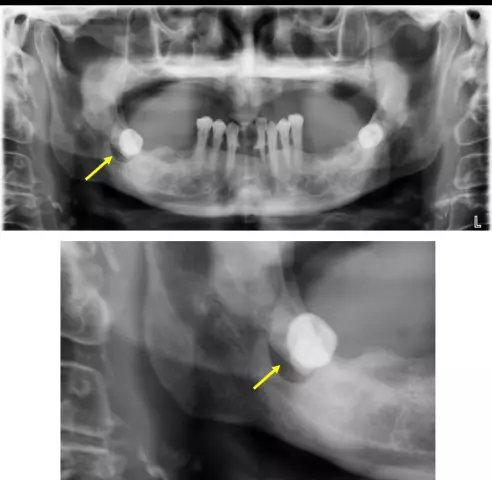- Author Rachel Wainwright wainwright@abchealthonline.com.
- Public 2023-12-15 07:39.
- Last modified 2025-11-02 20:14.
Tooth sensitivity - types, causes, treatment and prevention

Hypersensitivity of the teeth or, scientifically, hyperesthesia is a disease in which the teeth respond with painful sensations to any irritants: cold, hot, too sweet or spicy food, brushing teeth and others. According to medical statistics, over the past few years, several times more patients complaining of increased sensitivity of teeth began to visit dentists, which indicates an increase in their non-carious diseases. What is the cause of tooth sensitivity and how can it be prevented?
Types of tooth sensitivity
Dentists classify hyperesthesia into three types:
- sensitivity of teeth to cold-hot, when the reaction occurs only under the influence of high or low temperatures;
- when, in addition to thermal effects on the teeth, it has an irritating effect and chemical irritants (sour, acute, etc.);
- when painful sensations arise in response to almost any stimulus.
It should be noted that the treatment of tooth sensitivity significantly complicates all dental procedures, since the patient feels pain. Moreover, pain can be of a different nature: aching or sharp pain, in one tooth or in the whole area of the teeth.
Reasons for tooth sensitivity
Increased sensitivity of teeth to various mechanical, thermal and chemical stimuli is often an integral symptom of many diseases: periodontal disease, caries, hypoplasia and enamel erosion. However, it happens that severe painful symptoms occur without visible disturbances in dentin and enamel.
In most cases, systemic hyperesthesia occurs due to malfunctions in the body. The reasons for the sensitivity of the teeth can be various diseases suffered by the patient in recent times, a lack of vitamins and microelements in the body, impaired phosphorus-calcium metabolism, and nervous stress.
Non-systemic hyperesthesia, when the sensitivity of an individual tooth occurs, is usually caused by defects in dentin or tooth enamel.
The mechanism of the development of tooth sensitivity is simple: under the influence of various negative factors, the tooth enamel becomes thinner, and small tubules open in the teeth, which open the way to the pulp and dental nerve. If the nerve and pulp are exposed, then any external stimulus causes pain and discomfort.
Several factors contribute to damage to tooth enamel:
- Inadequate nutrition, as a result of which the necessary trace elements do not enter the body. Excessive consumption of coffee, sweets, sweet carbonated water, acidic foods that destroy the protective layer of the tooth also contributes to damage to the enamel.
- Toothpastes with abrasive elements and too hard a toothbrush also damage tooth enamel and provoke gum tissue atrophy, which leads to exposure of the tooth neck.
- Untimely access to the dentist, non-observance of oral hygiene.
- Bad habits such as biting nails and clenching your teeth lead to the formation of microcracks and disrupt the integrity of the tooth enamel.

Teeth sensitivity to hot and cold temperatures can be due to pulp or dental nerve inflammation. Inflammation can occur after eating too cold food or having a tooth treated by the dentist. If the pain continues for several days, swelling appears, and the gums swell - this indicates a serious inflammatory process, and you need to seek help from a doctor.
Tooth sensitivity treatment
To choose an adequate treatment, you first need to identify the true cause of hyperesthesia. To do this, it is necessary to conduct a complete examination of the oral cavity, find and eliminate tooth damage: caries, enamel defects, tartar, pulpitis. Next, a special varnish or remineralizing preparations are applied to the teeth, which close the microcracks in the enamel. Due to the high content of fluoride, these preparations help to reduce the sensitivity of the teeth and saturate the teeth with the necessary elements: magnesium, calcium, fluoride. In order for these drugs to better penetrate into the tooth enamel, iontophoresis is used - a physiotherapeutic method for treating tooth sensitivity, thanks to which medicinal solutions are injected using weak galvanic discharges. Further, the patient, if desired, can continue independent treatment. For this, special nozzles are used - mouth guards containing substances that reduce the sensitivity of the teeth (desensitizing substances).
Prevention of tooth sensitivity
Following these tips can help you avoid or achieve a reduction in tooth sensitivity:
- Do not eat foods that are too sour or sweet. Be sure to include foods containing vitamin A (carrots, eggs, liver), phosphorus and calcium (sea fish, cottage cheese, milk) in the diet. Rinse your teeth after every meal.
- Buy yourself a toothbrush with soft bristles, and try to brush your teeth without making too sharp and pressing movements. You should not abuse whitening pastes, as they contain abrasive substances that erase tooth enamel. But medical toothpastes should be treated with increased attention, since they contain special substances that help reduce the sensitive dentinal layer.
- If you decide to have your teeth whitened, choose the most gentle method. The best choice is laser or ultrasonic whitening.
Folk remedies for tooth sensitivity
Our ancestors knew many folk methods with which they fought hyperesthesia. So, for example, a proven folk remedy for tooth sensitivity is natural cow's milk without chemicals.
Rinsing with tea tree oil strengthens the tooth enamel well. Stir three drops of tea tree oil in a glass of water and rinse your mouth. It has an antimicrobial effect, eliminates unpleasant odor, and also helps to strengthen teeth and gums, prevents the development of periodontal disease and caries.
Particular attention should be paid to foods with vitamin D content: mackerel, herring, butter, mackerel fish, dairy products, cheese, tuna.
Found a mistake in the text? Select it and press Ctrl + Enter.






